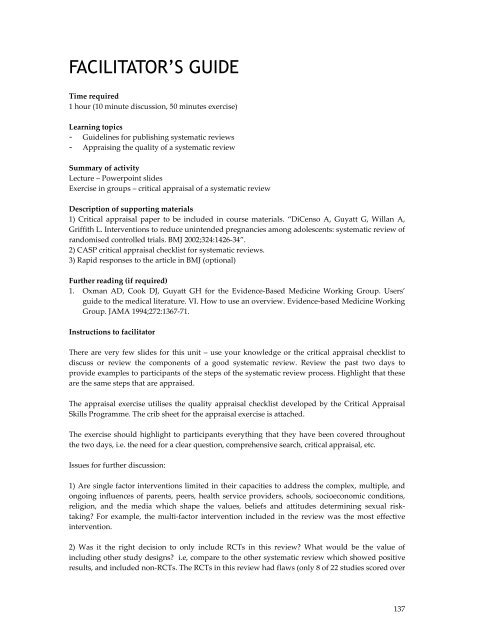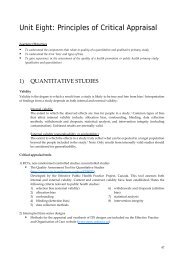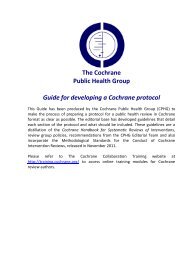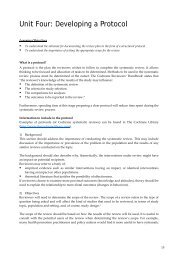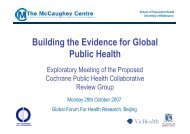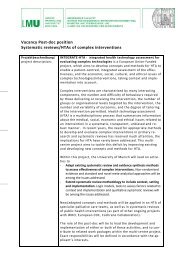Train the Trainer Course book - Cochrane Public Health Group
Train the Trainer Course book - Cochrane Public Health Group
Train the Trainer Course book - Cochrane Public Health Group
You also want an ePaper? Increase the reach of your titles
YUMPU automatically turns print PDFs into web optimized ePapers that Google loves.
FACILITATOR’S GUIDE<br />
Time required<br />
1 hour (10 minute discussion, 50 minutes exercise)<br />
Learning topics<br />
- Guidelines for publishing systematic reviews<br />
- Appraising <strong>the</strong> quality of a systematic review<br />
Summary of activity<br />
Lecture – Powerpoint slides<br />
Exercise in groups – critical appraisal of a systematic review<br />
Description of supporting materials<br />
1) Critical appraisal paper to be included in course materials. “DiCenso A, Guyatt G, Willan A,<br />
Griffith L. Interventions to reduce unintended pregnancies among adolescents: systematic review of<br />
randomised controlled trials. BMJ 2002;324:1426-34”.<br />
2) CASP critical appraisal checklist for systematic reviews.<br />
3) Rapid responses to <strong>the</strong> article in BMJ (optional)<br />
Fur<strong>the</strong>r reading (if required)<br />
1. Oxman AD, Cook DJ, Guyatt GH for <strong>the</strong> Evidence-Based Medicine Working <strong>Group</strong>. Users’<br />
guide to <strong>the</strong> medical literature. VI. How to use an overview. Evidence-based Medicine Working<br />
<strong>Group</strong>. JAMA 1994;272:1367-71.<br />
Instructions to facilitator<br />
There are very few slides for this unit – use your knowledge or <strong>the</strong> critical appraisal checklist to<br />
discuss or review <strong>the</strong> components of a good systematic review. Review <strong>the</strong> past two days to<br />
provide examples to participants of <strong>the</strong> steps of <strong>the</strong> systematic review process. Highlight that <strong>the</strong>se<br />
are <strong>the</strong> same steps that are appraised.<br />
The appraisal exercise utilises <strong>the</strong> quality appraisal checklist developed by <strong>the</strong> Critical Appraisal<br />
Skills Programme. The crib sheet for <strong>the</strong> appraisal exercise is attached.<br />
The exercise should highlight to participants everything that <strong>the</strong>y have been covered throughout<br />
<strong>the</strong> two days, i.e. <strong>the</strong> need for a clear question, comprehensive search, critical appraisal, etc.<br />
Issues for fur<strong>the</strong>r discussion:<br />
1) Are single factor interventions limited in <strong>the</strong>ir capacities to address <strong>the</strong> complex, multiple, and<br />
ongoing influences of parents, peers, health service providers, schools, socioeconomic conditions,<br />
religion, and <strong>the</strong> media which shape <strong>the</strong> values, beliefs and attitudes determining sexual risktaking?<br />
For example, <strong>the</strong> multi-factor intervention included in <strong>the</strong> review was <strong>the</strong> most effective<br />
intervention.<br />
2) Was it <strong>the</strong> right decision to only include RCTs in this review? What would be <strong>the</strong> value of<br />
including o<strong>the</strong>r study designs? i.e, compare to <strong>the</strong> o<strong>the</strong>r systematic review which showed positive<br />
results, and included non-RCTs. The RCTs in this review had flaws (only 8 of 22 studies scored over<br />
137


